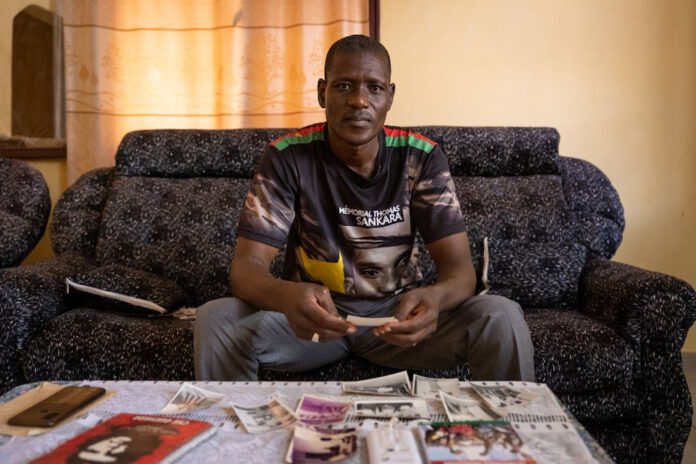Stanislas Damiba, association of former students trained in Cuba’s president, looks at old photos of Cuba, in Ouagadougou, on November 5, 2021. — AFP pic
OUAGADOUGOU, Nov 12 — Thirty-five years ago, Burkina Faso’s radical leader Thomas Sankara sent 600 youngsters, most of them orphans, to train in Cuba — a scheme, he declared, that would steer the country to a new dawn.
Within a year, Sankara’s dream of immersing marginalised children in Burkina’s revolution was wrecked after he was cut down by assassins.
Today, scores of those who were enrolled in his scheme have died before their time, some by suicide, and many have mental health problems.
Others live in limbo, eking out a life despite gaining qualifications in Cuba that their home country does not recognise.
Sankara came to power in 1983 at the age of 33, an idealistic army captain who wanted to eradicate poverty in his country and challenge the “imperialist” world order.
The Marxist-Leninist turned instinctively to Cuba and Fidel Castro.
“Sankara had the idea of sending a contingent of students to be trained in Cuba — politically, ideologically and professionally,” Stanislas Damiba, who was 12 at the time he made the journey, told AFP.
The group consisted of 600 children and adolescents aged 12 to 16, including 135 girls, “all from disadvantaged families and most of them orphans,” said Damiba.
On their return to Burkina, said Sankara, they would be a spearhead — a generation hardened in doctrine and trained in badly needed skills.
‘Spiritual father’
Damiba, 46, is president of the Association of Former Students Trained in Cuba — individuals who are often called the “Sankara Orphans.”
Today he has become a senior civil engineering technician in the private sector but proudly wears a Sankara T-shirt to honour a man he still considers “a spiritual father”.
Joined by two comrades who were with him in Cuba, Florence Hien and Inoussa Dankambary, 51, Damiba made a point of meeting AFP journalists at the Thomas Sankara Memorial erected in Ouagadougou.
The statue marks the place where the young leader was shot dead during a putsch which, on October 15, 1987, brought to power Blaise Compaore, once his brother in arms and a close friend.
Compaore ruled for 27 years before being kicked out on the back of mounting street protests in 2014.
Damiba recalled the heady days when everything seemed possible.
After passing selection tests, “we headed off to Cuba in September 1986,” Damiba recalled.
Six Burkinabe teachers came with them to teach French, history, geography and sex education, while other specialised subjects were taught by Cubans.
The group was taken to the Isle of Youth, located in the southwest of Cuba and where students of 40 nationalities mingled. Their first requirement was to learn Spanish in six months.
‘Work hard’
Sankara visited Cuba in September 1987.
“Sankara came to shake our hands, one by one, and said to us, ‘Work hard and come back to build the nation’,” said Damiba.
But a month later, the “Father of the Revolution” was murdered.
“It came out of the blue. For three days we were too stunned to eat or or drink,” said Damiba.
“Everything changed–our six supervisors were recalled to the country and replaced by others,” he said.
The “rectification” of Sankara’s leftist policies had already started.
Burkina’s new government decided to “have us only do short studies” lasting a maximum of three years after the baccalaureate (high school) diploma, said Damiba.
Then a monthly scholarship of about US$100 (86 euros) a month was cut off, dealing a further blow to their chances. Only 33 of the 600 were able to gain a university education.
“Compaore wanted to destroy everything connected with Sankara,” said Hien.
Before they had left home they had been promised coveted jobs in the civil service on their return.
But only 240 out of the 600 “orphans” were given civil-service jobs on their return.
And the qualifications they gained in Cuba are not recognised by the Burkina state, despite a long-running legal battle mounted by Damiba’s association, which is also demanding compensation.
“They are underemployed, they hold junior positions compared with people who trained in other countries,” he said.
“What sickens us is that we didn’t ask to go to Cuba — we don’t understand why when we came back, we were given the brush-off.”
‘Nothing but the truth’
Damiba, Dankambary, also a senior civil engineering technician, and Hien, a nurse, have managed to get by in the private sector.
Others have been less lucky.
Eight-six “orphans” have died, including “five or six” who committed suicide, said Damiba.
Many survivors are unemployed or live from hand to mouth.
“Some of them are mentally unbalanced, and many are suffering psychologically,” he said.
The trial of Sankara’s alleged assassins, including Compaore, opened in Ouagadougou in early October.
Damiba said he was desperate to hear “the truth, nothing but the truth” from the case.
“We are victims and president Compaore is accountable,” he said. “We didn’t shoot anyone, we are just innocent people.”
Said Dankambary: “The bullet which killed Sankara killed many people by ricochet, including us.” — AFP


